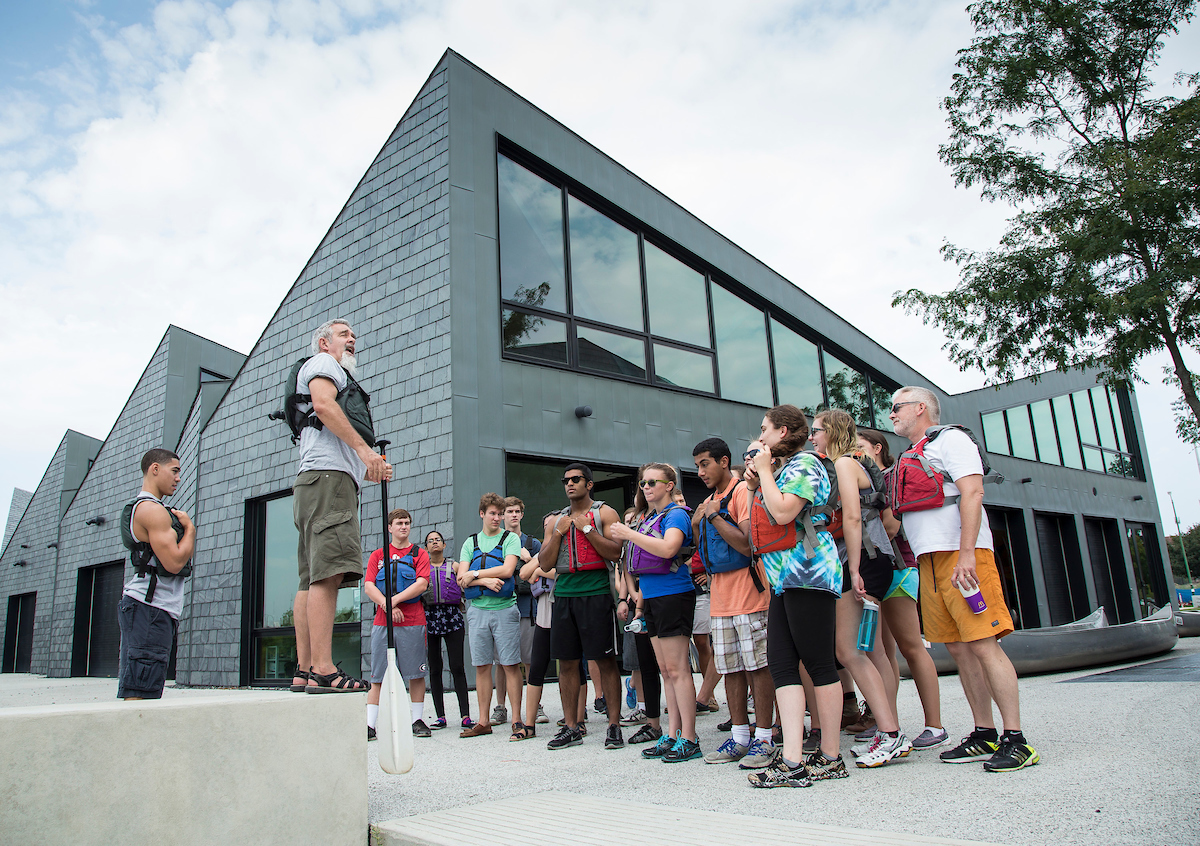 Students in James Montgomery's (far right, orange shorts) Discover Chicago course, "City on the Lake," gear up for a kayak outing. Montgomery is one of several DePaul faculty and staff presenting about Chicago as a classroom tool in the inaugural Chicago Research Summit. (DePaul University/Jeff Carrion)
Students in James Montgomery's (far right, orange shorts) Discover Chicago course, "City on the Lake," gear up for a kayak outing. Montgomery is one of several DePaul faculty and staff presenting about Chicago as a classroom tool in the inaugural Chicago Research Summit. (DePaul University/Jeff Carrion)On Friday, Oct. 18, the inaugural
Chicago Research Summit will kick off at North Park University. The conference includes a number of faculty and staff from DePaul's Chicago Quarter Program. They will present on Chicago as a classroom tool and research topic. Members of the university community are welcome
to purchase tickets.
Developed by members from various institutions in Chicago, the CRS seeks to foster a connected community among researchers, librarians, museum curators, archivists and regional university faculty and staff. Through connections and the sharing of idea, organizers hope Chicago will be integrated further into classrooms, undergraduate research and curriculum implementation.
For Jill King, a member of the summit planning committee and the music librarian at DePaul, the most important aspect of the event is the community-building and idea curation that will help make Chicago more of a classroom topic.
“We want the event to be a place where faculty and educators from around the city can come together and talk about involving undergraduate students in Chicago-based research,” King says. “We know a lot of faculty across institutions were interested in getting students out in the city and doing hands-on research. We want to highlight the potential of how those experiences can enhance student learning and the impact it can have our city.”
Using Chicago as a classroom is a common concept at DePaul. The university has two Chicago specific courses the majority of students take -- Discover Chicago and Explore Chicago. For Doug Long, a presenter at the summit and director of First-Year Programs where Discover and Explore Chicago are housed, the courses are an important part of student transition into university and city life.
“The courses not only teach the ‘how-to’s’ of the university campus, but also expose students to the city right outside the door,” Long says. “We are unique because we use place as the central focus in these transitionary classes. Students here chose an urban university, presumably in part because they wanted to use Chicago and experience it. These classes give them a tool to do that.”
With a number of Chicago Quarter Program faculty speaking at the event, Long and other DePaul presenters envision the university becoming a more prominent pillar of research in Chicago.
“We would like the city of Chicago to think of DePaul as ‘Chicago’s University,’” he says.
It is exactly the idea of getting students into the city that has DePaul associate professor of environmental science, James Montgomery, speaking at the summit about his course-based undergraduate research experience. The CURE class he teaches -- environmental soil science -- is a health analysis of urban soils in Chicago.
Through hands-on work and soil research in this class, students not only get out into the city and talk with locals, but also help Montgomery complete research for his “What’s in your Soil?” project. The project and class seek to create a map of soil contamination, such as lead contamination and pH levels, in the city.
What remains important about the summit for Montgomery, however, is not only the ability to be able to promote this project, but also to find collaborators.
“I hope to learn about what others at the summit are doing and to see if there’s any potential for collaboration,” he says. “I think it is important to solve and address pressing issues, whatever they are, through collaboration among academic institutions, libraries and museums.”
Other DePaul faculty and staff that will speak at the event include Leah Bryant, College of Communication; Robin Hoecker, College of Communication; R. Craig Sautter, School of Continued and Professional Studies; Laura-Caroline Johnson, DePaul Art Museum, and Heather McShane, College of Liberal Arts and Social Sciences.